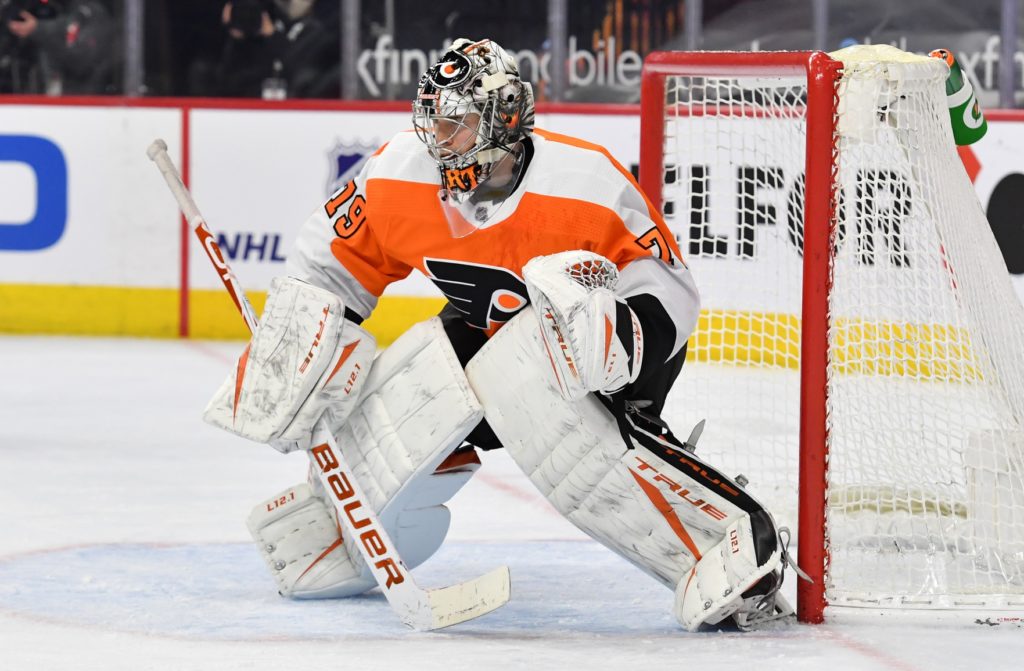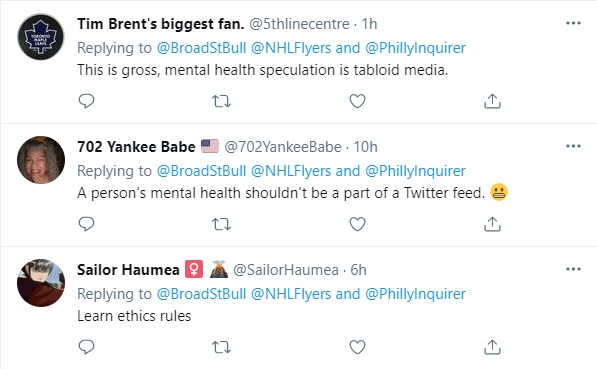Ad Disclosure
Sam Carchidi Receiving a LOT of Criticism for Article About Carter Hart and Sports Psychologist

One of the things that’s changed over the years is that we look at the concept of “mental health” from a completely different perspective.
Back in the day, men were supposed to suck it up and keep their feelings to themselves, or else they were labeled “soft.” Any outward display of weakness was regarded as taboo by past iterations of society, which believed that internal struggles should remain internal. You were supposed to “get over it” and move on.
In 2021, we’ve evolved to the point where a large number of people now encourage open dialogue on mental health, and you’re not seen as a wuss for speaking about your struggles.
This topic manifested Monday in an article written by Sam Carchidi at the Philadelphia Inquirer, titled Struggling Flyers goalie Carter Hart split with longtime sports psychologist; has it affected his play?. Below that title is a subheader reading – “Hart’s struggles on the ice may be connected to a split with his long-time sports psychologist and confidant, John Stevenson. The Flyers’ goalie will sit out at least three straight games.”
Carchidi was severely ‘ratioed’ on Twitter, which means the replies were incredibly negative. So we decided to actually read the entire story from start to finish and see why people are upset about it.
Writes Sam:
“The Flyers are giving Carter Hart his longest break from game action this season, hoping the extra work with goaltender coach Kim Dillabaugh will straighten him out.
But Hart, according to a league source, split up with his longtime sports psychologist and confidant, John Stevenson, before the season. And that might have as much to do with his struggles as his play on the ice. The split was because of something out of either person’s control, and not because of a conflict with each other, the source said.
Hart, 22, had been working with Stevenson since he was in grammar school in Alberta, and he has said being a goaltender is more about how you approach the game with your mind.”
Okay, so there’s some reporting/speculation there via an anonymous source. I don’t know what rules the Inquirer sets for writers, but the industry standard used to be three sources minimum to confirm a story, or two if you really felt like you had the details nailed down. These days, one-source reporting is much more common than it used to be.
Let’s continue:
Hart, who was not available to comment Monday, has said Stevenson helped him not only in hockey, “but life itself. … He’s not only just my sports psychologist, but he’s a good friend of mine, so I can talk to him about pretty much anything, which is really nice to have. You can talk to your parents pretty much about anything, but there are some things you can’t tell your parents.”
Before the breakup, Hart said he tried to talk to Stevenson once a week during the season to fine-tune his mental approach to hockey.
Contacted in a text, Stevenson said he didn’t want to talk about the situation with Hart “out of respect for Carter.” He would not confirm or deny the split with his client.
Hmm. Alright.
The source of the ire stems from Carchidi presenting this story via a source, but without on-record confirmation from Hart or Stevenson. In turn, hockey fans think that Sam is going down an inappropriate road because he’s speculating about the mental health of a 22 year old, which they believe should be totally off limits.
These individual opinions are obviously influenced by how one views the job of the sports psychologist.
In general terms, the role of this person is to help maximize performance while considering the well-being of the athlete. This can present itself in a variety of ways. A sports psychologist may help an athlete tune out the media and fan criticism and better focus on their craft. They might help narrow a focus via goal-setting, or help recalibrate an approach to the game. They can help with assimilating into a new culture and living in a new city and making the necessary adjustments to new settings.
There’s a mental health component to all of this, certainly, but in Sam’s story, I don’t think he’s suggesting that Hart is soft, or weak, or anything of the sort. The column, citing a source, asserts that he’s lost a confidant and helpful figure in his life. If you’re close with someone and receive tangible benefits via that relationship, naturally you might struggle if that connection no longer exists. It would be the same as Carson Wentz connecting with an assistant coach (Frank Reich), and perhaps failing to perform as well with a new coach (Mike Groh).
Here’s a sampling of the criticism directed at Carchidi:
There were something like 275 quote tweets ripping the article, with national NHL writers and blue checkmarks voicing their displeasure as well. The push back is all the same – it’s people who feel like the topic constitutes an invasion of privacy and should be off-limits in general.
That’s exhibited in Stevenson’s reply via text, saying that he didn’t want to comment “out of respect for Carter.” The client/provider relationship is typically viewed as sacred in any profession of this sort, and Stevenson is adhering to those rules.
In this case, the job of the media is to look for answers to our questions. Why is Carter Hart struggling? Carchidi presents a possible explanation via a singular source, which doesn’t help in the credibility department. In doing so, a large portion of people who believe sports psychology overlaps with personal mental health believe that a line was crossed in the process. The problem is that the line is always blurry and always moving, and sometimes you step over it without realizing.
Edit – I think it’s also worth pointing out that a lot of Flyers fans push back on criticism of Hart because of his age. You hear a lot of, “he’s only 22, leave him alone!” type of stuff on social media, which I’m sure played a part in how people reacted to this particular story, even though it was about mental health specifically, and not him being a young player.
Kevin has been writing about Philadelphia sports since 2009. He spent seven years in the CBS 3 sports department and started with the Union during the team's 2010 inaugural season. He went to the academic powerhouses of Boyertown High School and West Virginia University. email - k.kinkead@sportradar.com
